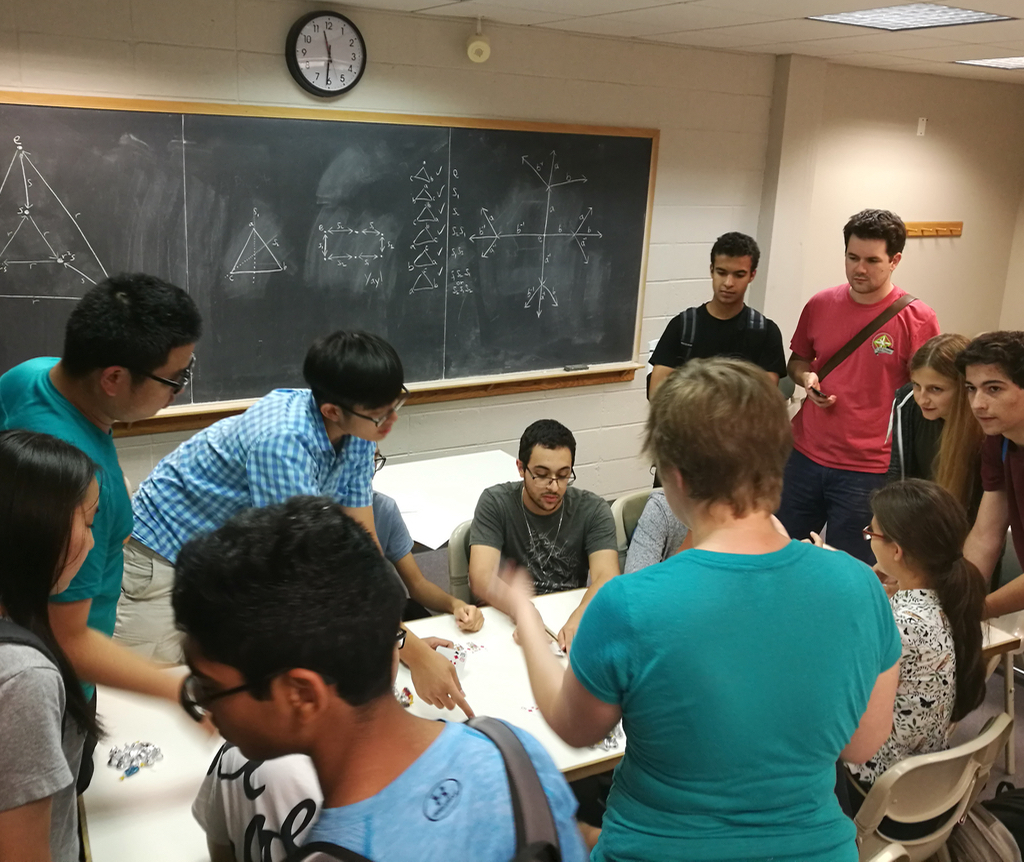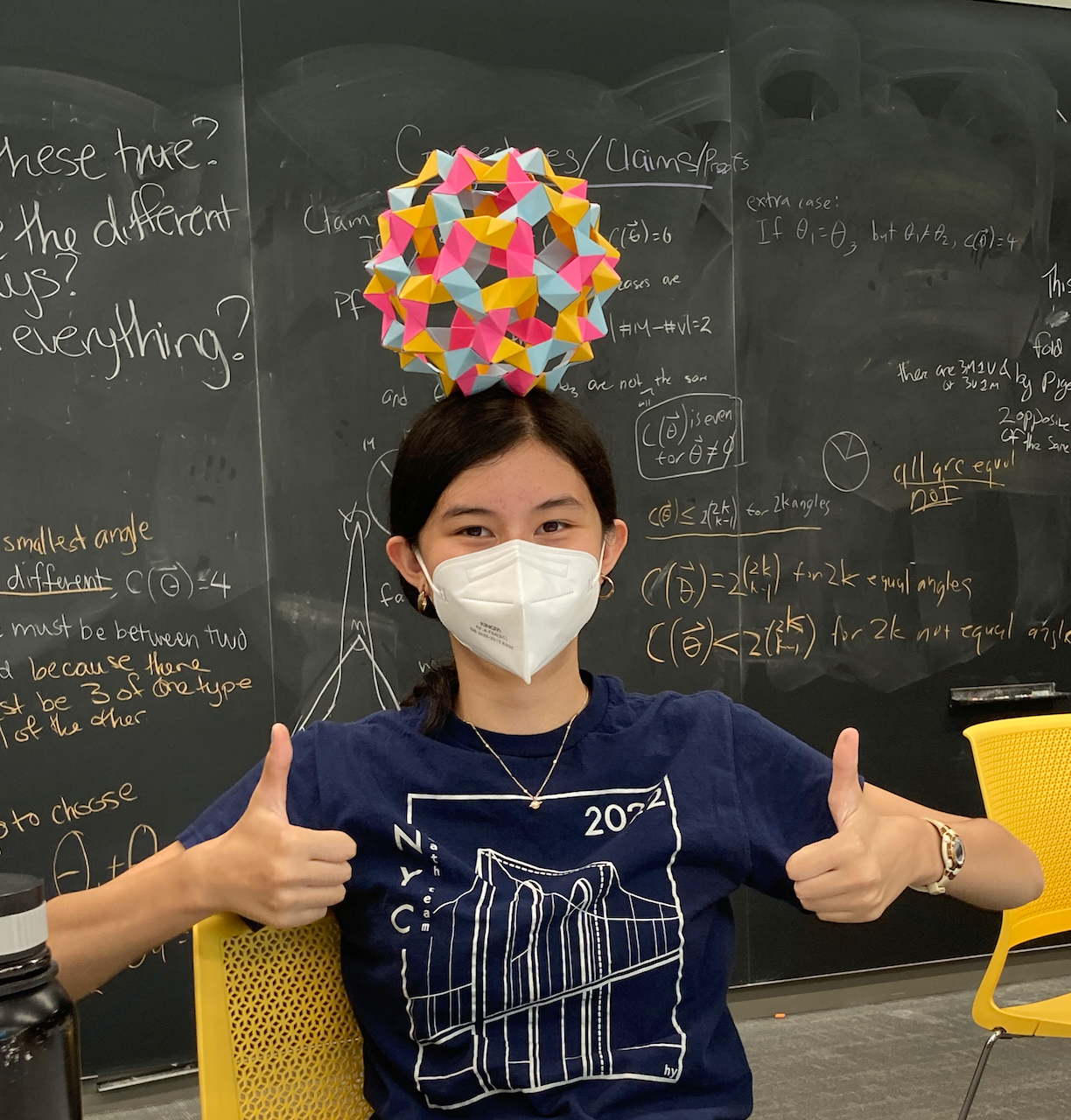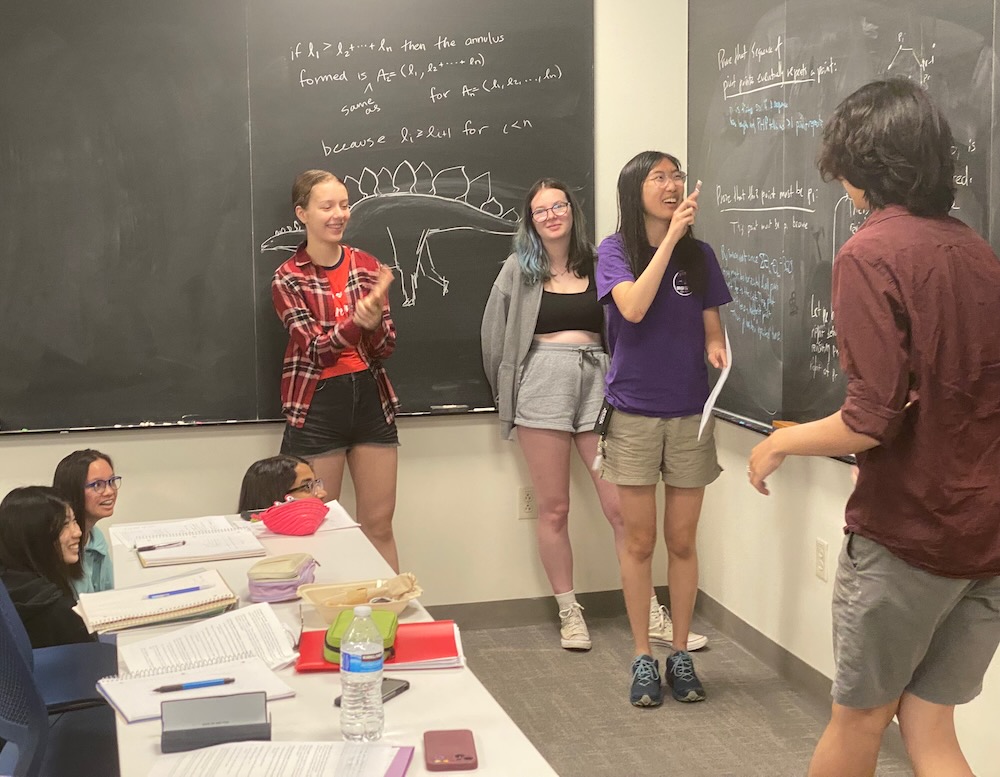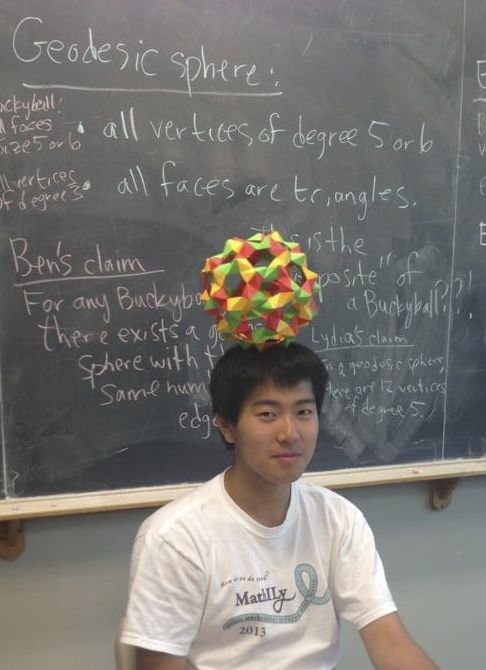
mathematical card playing
The Week of Chaos class on poker-strategy probabilities meets the Daily Gather on multiset poker.
(What is that question asking?!)
Why are these programs called MathILy and MathILy-Er? If you want the answer to that question, go to the bottom of this page.
Why attend {MathILy, MathILy-Er} instead of taking college courses, or working at a summer job?
As the saying goes, your mileage may vary when taking summer college courses. Some of your fellow students will be committed to learning and others will be there to repeat a failed course or to fill a requirement. Similarly, courses can be taught by great teachers, or by people who are overworked or who lack experience. The material itself may be presented at a low level.

The Week of Chaos class on poker-strategy probabilities meets the Daily Gather on multiset poker.
At {MathILy, MathILy-Er}, every student is excited to learn mathematics. The instructors are passionate and inspiring, and teach at {MathILy, MathILy-Er} because they love to share mathematics with talented high-school students. It's certain that you'll be challenged mathematically---if you can show mastery of a topic the class is discussing, the instructors will write harder problems especially for you.
At {MathILy, MathILy-Er}, you get to be around mathematically enthusiastic peers; you have round-the-clock access to college math students and professional mathematicians, and of course to exciting mathematics itself.
In terms of economic benefit, the cost of taking intense and elite-college-level classes in the summer is much less than paying tuition for the same amount of coursework at an elite college. Many students who attend selective summer mathematics programs are able to get course prerequisites waived on entrance to college. In the long term, this saves money.
Why should I (or my progeny) go to {MathILy, MathILy-Er} instead of some other summer mathematics program, of which there are many?
There are a lot of summer mathematics programs. Most of them are local or regional, and a few are nationally/internationally selective. The short answer to the question is that we're different, and (of course) we think we're better, and here's how we're different and why we think these differences matter.
Being admitted to {MathILy, MathILy-Er} indicates that a student is ready for more advanced material and greater challenges than local or regional programs typically offer. MathILy-Er specifically helps students level up in expressing mathematics clearly, which is a skill not generally addressed at local or regional summer mathematics programs.
MathILy is comparable in level and intensity to selective programs such as Mathcamp, SUMaC, HCSSiM, PROMYS, and the Ross Program. MathILy-Er is also selective, and trains students who are not yet ready for MathILy---because they are slightly earlier in their mathematical developments---to be prepared for programs at MathILy level.

This photo taken without cognizance of the 1st MathILy photo below.
Each selective program has its own distinct atmosphere and mathematical focus. Our style is to treat serious mathematics with levity, to teach via inquiry-based learning, and to maximize the quality of experience for every participant with a view toward significant academic and personal growth.
We emphasize mathematics that is pure but applicable. Mathematics is useful in solving a very wide variety of practical problems---and there are whole areas of study that apply mathematics, such as information theory, operations research, and theoretical computer science, that most high-school students (and many college mathematics majors) never encounter. We give students the opportunity to become aware of these extremely cool fields of work that apply mathematics. The best preparation for a career in applied mathematics is studying undergraduate pure mathematics. So, we teach and do pure mathematics, but there's so much interesting mathematics that we can select a bunch of material that leads right into applications.
Our core curriculum is discrete mathematics (and for us, that includes combinatorics, graph theory, and, at MathILy theoretical linear algebra, and at MathILy-Er binary linear algebra). This isn't all the math we do---we do much more math, and of many more kinds, but we start with the core. As time goes on, more and more mathematics that is done, both in academia and in industry, is discrete. Discrete mathematics, broadly conceived, underpins about half of pure mathematics and of operations research as well as all of computer science. So that we can offer introductions to a range of mathematical topics that are applicable or applied, we want all students to acquire a common core background in the first weeks of the program.
Classes are all taught using discovery- or inquiry-based learning as well as collaborative learning. In other words, we don't bore our students by lecturing at them, but instead give our students just enough information that they, the students, collectively advance class knowledge. In our experience, this not only means that classes learn more material, but that they learn it much more deeply. (For research on the efficacy of inquiry-based learning in mathematics, see here. There is also recent research on active and collaborative learning in mathematics.) Our Lead Instructors are all experienced in the use of active learning techniques, and Apprentice Instructors are trained in active learning pedagogy prior to the program (as well as during the program while under supervision of Lead Instructors).


All instructors focus on training and mentoring students so that no matter what level they are at mathematically, their skills and capabilities will increase substantially. We give students lots of feedback, on their written work, on their verbal presentations of mathematics, on how they can get even more out of their educational experiences, and on how they are progressing in mathematics. Students learn to think more clearly, write more precisely, and verbally explain their work well. We build this kind of training into our classes, and guide our instructors in student mentoring.
We try to be as inclusive as possible. Our community standards take different perspectives into consideration. We believe that everyone should feel heard in a discussion. All members are encouraged to respect themselves and others. This includes accepting fellow mathematics scholars of all ethnicities, national origins, socioeconomic classes, ages, sexes, genders, sexual orientations, physical abilities, and religious and political persuasions.
At {MathILy, MathILy-Er}, students and instructors do real math, and a lot of it, and in a goofy/silly way. Doing challenging work can be, and should be, fun. We think this is so important that we built it right into the names: Mathematics Infused with Levity, and the same, but Earlier. The only problem with this paragraph (indeed, this whole page) is that it's too serious.
Boring but informative:
The MathILy 2025 annual report and the MathILy-Er 2025 annual report (.pdfs, as submitted to the Mathematical Staircase, Inc. Board of Directors).
The MathILy 2024 annual report and the MathILy-Er 2024 annual report (.pdfs, as submitted to the Mathematical Staircase, Inc. Board of Directors).
The MathILy 2023 annual report and the MathILy-Er 2023 annual report (.pdfs, as submitted to the Mathematical Staircase, Inc. Board of Directors).
The MathILy 2022 annual report and the MathILy-Er 2022 annual report (.pdfs, as submitted to the Mathematical Staircase, Inc. Board of Directors).
The MathILy 2021 annual report and the MathILy-Er 2021 annual report (.pdfs, as submitted to the Mathematical Staircase, Inc. Board of Directors).
The MathILy 2020 annual report and the MathILy-Er 2020 annual report (.pdfs, as submitted to the Mathematical Staircase, Inc. Board of Directors).
The MathILy 2019 annual report and the MathILy-Er 2019 annual report (.pdfs, as submitted to the Mathematical Staircase, Inc. Board of Directors).
The MathILy 2018 annual report and the MathILy-Er 2018 annual report (.pdfs, as submitted to the Mathematical Staircase, Inc. Board of Directors).
The MathILy 2017 annual report and the MathILy-Er 2017 annual report (.pdfs, as submitted to the Mathematical Staircase, Inc. Board of Directors).
The MathILy 2016 annual report and the MathILy-Er 2016 annual report (.pdfs, as submitted to the Mathematical Staircase, Inc. Board of Directors).
The MathILy 2015 annual report and the MathILy-Er 2015 annual report (.pdfs, as submitted to the Mathematical Staircase, Inc. Board of Directors).
The MathILy 2014 annual report (.pdf, as submitted to the Mathematical Staircase, Inc. Board of Directors).
The MathILy 2013 annual report (.pdf, as submitted to the Mathematical Staircase, Inc. Board of Directors).
MathILy, MathILy-Er, and MathILy-EST are projects of the nonprofit organization Mathematical Staircase, Inc..